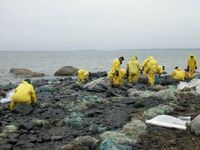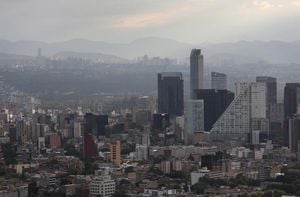A crude oil spill has created significant distress for tourists in the United Arab Emirates, particularly affecting several hotels along the coast. The incident, which occurred near the Novotel Fujairah, Al Bahar Hotel & Resort, and Ibis Fujairah, has led to the closure of some beaches and left vacationers grappling with a strong, unpleasant odor that can be detected even five kilometers away from the sea.
Reports indicate that the beaches began to be cleaned on April 11, 2025, but despite these efforts, the situation has barely improved. New oil spills have continued to occur, complicating cleanup efforts and raising concerns about the health of visitors. "The golden sands by the sea are disappearing, and the sun is scorching," lamented one tourist, highlighting the stark contrast between the usual idyllic beach setting and the current environmental crisis.
According to the Telegram channel Mash, the chemical spill has left the sea looking black in some areas, with large stains remaining on the beaches. The stench from the oil has become a health concern, with dozens of tourists reporting symptoms such as nausea, headaches, and sore throats after exposure. One tourist explained, "The smell is unbearable; it’s hard to enjoy the vacation when the air is filled with this toxic odor."
As the situation unfolds, the affected hotels have reportedly been unresponsive to guest complaints, with many tourists expressing frustration over the lack of assistance. "All the hotels are silent about the natural phenomenon and refuse to help guests; neither compensation nor investigation has been offered," stated another visitor. As a result, some guests have had to move to other accommodations at their own expense, further exacerbating their dissatisfaction with the trip.
The beaches have been closed for at least two weeks, and local authorities are warning that the cleanup process will take several more days to ensure that the health of tourists is not at risk. "We need at least a few days to restore cleanliness, then the health of tourists will not be threatened by anything," Mash reported.
The oil spill is believed to be linked to operations at the local port, which frequently receives vessels for refueling with fuel oil and motor oils. As such, environmental experts are concerned about the long-term implications of the spill on the local marine ecosystem.
Meanwhile, the Institute of Oceanology of the Russian Academy of Sciences has initiated an expedition to analyze the consequences of the oil spill in the Black Sea, with results expected to be published in a month. This research could provide valuable insights into the environmental impact of such spills and help inform future prevention measures.
In light of these events, Russian tourists are being warned about the potential health risks associated with the oil spill and are advised to stay informed about the situation. The incident serves as a stark reminder of the vulnerabilities associated with tourism in ecologically sensitive areas and the need for effective environmental management.
As cleanup efforts continue, both the local authorities and hotel management face mounting pressure to address the concerns of vacationers. The hope is that swift action will be taken to restore the beaches and ensure a safe environment for tourists, allowing them to enjoy the natural beauty that the UAE is known for.
While the immediate focus remains on addressing the fallout from the oil spill, the incident also raises broader questions about environmental oversight and the responsibilities of tourism operators. As the industry continues to recover from the impacts of the pandemic, ensuring the safety and satisfaction of visitors must remain a top priority.
As the situation develops, it is crucial for tourists to stay alert and make informed decisions about their travel plans. With the ongoing challenges posed by the oil spill, the UAE's reputation as a premier travel destination is at stake, and both the local government and the tourism sector must work collaboratively to mitigate the effects of this environmental crisis.








